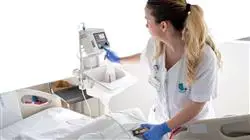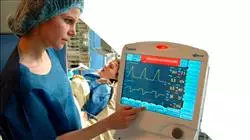University certificate
Accreditation/Membership
The world's largest faculty of nursing”
Introduction to the Program
Elevate your healthcare practice and update your knowledge in the field of Hospital Nursing with this Master's Degree from TECH. It’s the most complete on the market”

Hospital Nursing is an area of care that continues to grow. Not only because of their involvement in the interpretation of the needs derived from each of the states of the health-disease process, but also because of their involvement in serving as a link with the families and with the rest of the health agents. Therefore, professionals working in this sector must continually update their knowledge, as this is the only way they can respond effectively to patient's needs.
Taught 100% online, this Master's Degree offers nurses the possibility of continuing to develop in their professional practice with the guarantees that come with truly innovative and updated knowledge. All of them based on the latest scientific evidence and the latest findings applied to Hospital Nursing practice. An innovative way of studying that provides the student not only with the best theoretical content, but also with a series of practical activities presented with multimedia material that enriches and makes learning more effective.
Additionally, this program is unique in that it offers students a space to acquire and update their skills in the area of hospital care. Based on these new approaches, the nurses will be able to make the appropriate decisions in the complex clinical situations that may arise during the development of their care activity.
The content of the program aims to strengthen the nurse's advanced professional skills, which are essential to provide quality professional services. As a result, and thanks to these new approaches, students will enhance their professional development in clinical practice and will acquire the skills they need to work in changing hospital environments made up of multidisciplinary teams.
Learn about the latest developments in the treatment of patients in special situations such as pregnancy or pluripathologies, becoming a first level nurse"
This Master's Degree in Hospital Nursing contains the most complete and up-to-date scientific program on the market. Its most notable features are:
- The development of case studies presented by experts in Hospital Nursing
- The graphic, schematic, and eminently practical contents with which they are created, provide scientific and practical information on the disciplines that are essential for professional practice
- Practical exercises where self-assessment can be used to improve learning
- Its special emphasis on innovative methodologies
- Theoretical lessons, questions to the expert, debate forums on controversial topics, and individual reflection assignments
- Content that is accessible from any fixed or portable device with an Internet connection
You will become the most effective link between patients, families and other healthcare teams. This way, you will favor a correct and effective communication”
The program’s teaching staff includes professionals from sector who contribute their work experience to this training program, as well as renowned specialists from leading societies and prestigious universities.
The multimedia content, developed with the latest educational technology, will provide the professional with situated and contextual learning, i.e., a simulated environment that will provide immersive training programmed to train in real situations.
This program is designed around Problem-Based Learning, whereby the professional must try to solve the different professional practice situations that arise during the academic year. For this purpose, the student will be assisted by an innovative interactive video system created by renowned and experienced experts.
From a 100% online study methodology, you will be able to update your knowledge in the field of Hospital Nursing"

You will have the best multimedia resources with which you will be able to enrich your learning and put what you have studied into practice in a much easier way"
Why study at TECH?
TECH is the world’s largest online university. With an impressive catalog of more than 14,000 university programs available in 11 languages, it is positioned as a leader in employability, with a 99% job placement rate. In addition, it relies on an enormous faculty of more than 6,000 professors of the highest international renown.

Study at the world's largest online university and guarantee your professional success. The future starts at TECH”
The world’s best online university according to FORBES
The prestigious Forbes magazine, specialized in business and finance, has highlighted TECH as “the world's best online university” This is what they have recently stated in an article in their digital edition in which they echo the success story of this institution, “thanks to the academic offer it provides, the selection of its teaching staff, and an innovative learning method aimed at educating the professionals of the future”
A revolutionary study method, a cutting-edge faculty and a practical focus: the key to TECH's success.
The most complete study plans on the university scene
TECH offers the most complete study plans on the university scene, with syllabuses that cover fundamental concepts and, at the same time, the main scientific advances in their specific scientific areas. In addition, these programs are continuously being updated to guarantee students the academic vanguard and the most in-demand professional skills. In this way, the university's qualifications provide its graduates with a significant advantage to propel their careers to success.
TECH offers the most comprehensive and intensive study plans on the current university scene.
A world-class teaching staff
TECH's teaching staff is made up of more than 6,000 professors with the highest international recognition. Professors, researchers and top executives of multinational companies, including Isaiah Covington, performance coach of the Boston Celtics; Magda Romanska, principal investigator at Harvard MetaLAB; Ignacio Wistumba, chairman of the department of translational molecular pathology at MD Anderson Cancer Center; and D.W. Pine, creative director of TIME magazine, among others.
Internationally renowned experts, specialized in different branches of Health, Technology, Communication and Business, form part of the TECH faculty.
A unique learning method
TECH is the first university to use Relearning in all its programs. It is the best online learning methodology, accredited with international teaching quality certifications, provided by prestigious educational agencies. In addition, this disruptive educational model is complemented with the “Case Method”, thereby setting up a unique online teaching strategy. Innovative teaching resources are also implemented, including detailed videos, infographics and interactive summaries.
TECH combines Relearning and the Case Method in all its university programs to guarantee excellent theoretical and practical learning, studying whenever and wherever you want.
The world's largest online university
TECH is the world’s largest online university. We are the largest educational institution, with the best and widest online educational catalog, one hundred percent online and covering the vast majority of areas of knowledge. We offer a large selection of our own degrees and accredited online undergraduate and postgraduate degrees. In total, more than 14,000 university degrees, in eleven different languages, make us the largest educational largest in the world.
TECH has the world's most extensive catalog of academic and official programs, available in more than 11 languages.
Google Premier Partner
The American technology giant has awarded TECH the Google Google Premier Partner badge. This award, which is only available to 3% of the world's companies, highlights the efficient, flexible and tailored experience that this university provides to students. The recognition as a Google Premier Partner not only accredits the maximum rigor, performance and investment in TECH's digital infrastructures, but also places this university as one of the world's leading technology companies.
Google has positioned TECH in the top 3% of the world's most important technology companies by awarding it its Google Premier Partner badge.
The official online university of the NBA
TECH is the official online university of the NBA. Thanks to our agreement with the biggest league in basketball, we offer our students exclusive university programs, as well as a wide variety of educational resources focused on the business of the league and other areas of the sports industry. Each program is made up of a uniquely designed syllabus and features exceptional guest hosts: professionals with a distinguished sports background who will offer their expertise on the most relevant topics.
TECH has been selected by the NBA, the world's top basketball league, as its official online university.
The top-rated university by its students
Students have positioned TECH as the world's top-rated university on the main review websites, with a highest rating of 4.9 out of 5, obtained from more than 1,000 reviews. These results consolidate TECH as the benchmark university institution at an international level, reflecting the excellence and positive impact of its educational model.” reflecting the excellence and positive impact of its educational model.”
TECH is the world’s top-rated university by its students.
Leaders in employability
TECH has managed to become the leading university in employability. 99% of its students obtain jobs in the academic field they have studied, within one year of completing any of the university's programs. A similar number achieve immediate career enhancement. All this thanks to a study methodology that bases its effectiveness on the acquisition of practical skills, which are absolutely necessary for professional development.
99% of TECH graduates find a job within a year of completing their studies.
Master's Degree in Hospital Nursing
Hospital nursing is a branch of nursing that deals with the care of patients in hospitals and other health care settings. Hospital nurses work closely with physicians, therapists and other healthcare professionals to provide care and treatment to sick and injured patients. Hospital nurses work to ensure patient wellness, infection prevention, pain management, health promotion and emotional support for patients and their families during the care process.
Hospital nurses work to ensure patient wellness, infection prevention, pain management, health promotion and emotional support for patients and their families during the care process.
Hospital nurses are responsible for the care of patients and their families.
Hospital nurses' duties include monitoring patients' conditions, administering medications and treatments, preparing for and assisting with medical procedures, conducting medical records, and communicating with patients and their families about their care. They may also collaborate with other health care professionals in hospital discharge planning and transitioning patients to follow-up care.
Hospital nurses may specialize in specific areas such as intensive care, pediatrics, oncology, neonatology, among others. Hospital nursing also encompasses a variety of settings, including medical and surgical units, intensive care units, emergency and palliative care.
In addition, hospital nurses must be able to provide care to patients with diverse needs, while respecting patients' rights and dignity, and maintaining the highest standards of ethics and professionalism. They must also be able to work under high-pressure conditions, and have leadership and teamwork skills in a dynamic health care environment.
Hospital nursing is a set of skills and knowledge used to provide medical care and treat sick and injured patients in a hospital or similar setting. Hospital nurses work closely with other health care professionals to provide effective care and attention to patients, and must be able to work in high-pressure environments while maintaining high standards of ethics and professionalism.







